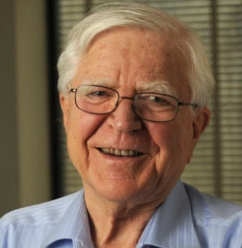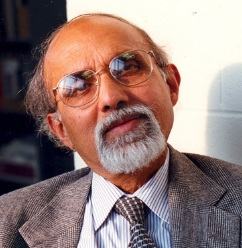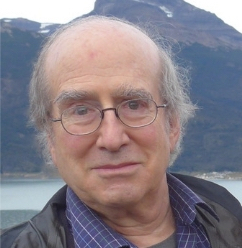We are pleased to have honored Michael Athans, Dimitri Bertsekas, G. David Forney, Jr., Robert Gallager, Sanjoy Mitter, and Alan Willsky during the LIDS@80 celebration, recognizing their significant and lasting impact.
During the celebration we presented each honoree with their academic genealogy — to honor both their distinguished academic lineage and the many students they have in turn guided. Electronic versions can be seen here: Athans, Bertsekas, Forney, Gallager, Mitter, Willsky.
Michael Athans
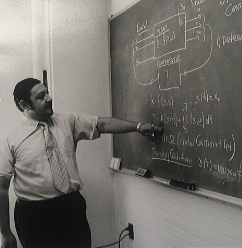 Michael Athans was born in Drama, Greece. He came to the United States in 1954 and attended the University of California at Berkeley from 1955 to 1961 where he received his BSEE in 1958 (with highest honors), MSEE in 1959, and Ph.D. in control in 1961.
Michael Athans was born in Drama, Greece. He came to the United States in 1954 and attended the University of California at Berkeley from 1955 to 1961 where he received his BSEE in 1958 (with highest honors), MSEE in 1959, and Ph.D. in control in 1961.
He began his career at MIT Lincoln Laboratory in 1961, and joined the MIT faculty as part of the Electrical Engineering and Computer Science Department in 1964 where he was a professor until his early retirement from MIT in 1998. He was the LIDS director from 1974 to 1981. In 1978 he co-founded ALPHATECH Inc., and he has consulted for numerous other industrial organizations and government panels. In 1995 he was a Visiting Professor at the National Technical University of Athens, Greece. From 1998 – 2012 he served as an Invited Research Professor in the Institute for Systems and Robotics, Instituto Superior Técnico, Lisbon, Portugal. In 2011, he was awarded an honorary doctorate by the Universidade Técnica de Lisboa.
Michael is the co-author of Optimal Control (McGraw Hill, 1966), Systems, Networks and Computation: Basic Concepts (McGraw Hill, 1972) and Systems, Networks and Computation: Multivariable Methods (McGraw Hill, 1974). He was the first recipient of the American Automatic Control Council’s Donald P. Eckman Award (1964) as well as the first recipient of the Frederick E. Terman Award of the American Society for Engineering Education (1969). In 1980 he received the second Education Award of the American Control Council. He received the 1993 H.W. Bode Prize from the IEEE Control Systems Society, as well as the Richard E. Bellman Control Heritage Award of the American Automatic Control Council in 1995.
Michael is currently a Professor Emeritus in EECS. He is being honored at this event in absentia.
Dimitri Bertsekas
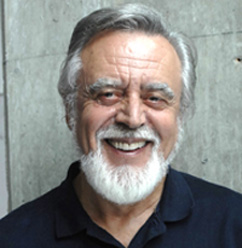 Dimitri P. Bertsekas’s undergraduate studies were in engineering at the National Technical University of Athens, Greece. He obtained his MS in electrical engineering at George Washington University in 1969, and his Ph.D. in system science in 1971 at MIT.
Dimitri P. Bertsekas’s undergraduate studies were in engineering at the National Technical University of Athens, Greece. He obtained his MS in electrical engineering at George Washington University in 1969, and his Ph.D. in system science in 1971 at MIT.
Dimitri has held faculty positions with the Engineering-Economic Systems Department, Stanford University (1971-1974) and the Electrical Engineering Department of the University of Illinois, Urbana–Champaign (1974-1979). Since 1979 he has been teaching in MIT’s Electrical Engineering and Computer Science Department, where he is the McAfee Professor of Engineering. He has held editorial positions in several journals. His research at MIT spans several fields, including optimization, control, large-scale computation, and data communication networks, and is closely tied to his teaching and book authoring activities. He has written sixteen books and research monographs, several of which are used as textbooks in MIT classes.
Dimitri was awarded the INFORMS 1997 Prize for Research Excellence in the Interface Between Operations Research and Computer Science for his book Neuro-Dynamic Programming (co-authored with John Tsitsiklis), the 2000 Greek National Award for Operations Research, the 2001 ACC John R. Ragazzini Education Award, the 2009 INFORMS Expository Writing Award, the 2014 ACC Richard E. Bellman Control Heritage Award, the 2014 Khachiyan Prize for lifetime accomplishments in optimization, and the SIAM/MOS 2015 George B. Dantzig Prize. In 2018, he was awarded jointly with John Tsitsiklis, the INFORMS John von Neumann Theory Prize. In 2001, he was elected to the United States National Academy of Engineering.
Dimitri is currently a Professor Post Tenure in EECS and a member of LIDS.
G. David Forney, Jr.
 G. David Forney, Jr. received a BSE in electrical engineering from Princeton University in 1961, and an ScD from MIT in 1965, under the supervision of Jack Wozencraft and Bob Gallager.
G. David Forney, Jr. received a BSE in electrical engineering from Princeton University in 1961, and an ScD from MIT in 1965, under the supervision of Jack Wozencraft and Bob Gallager.
Dave joined Codex Corp. in 1965, where he developed the first “modern” high-speed QAM telephone-line modem, and became Vice President of R&D. After Motorola acquired Codex in 1977, he continued as a Vice President of Motorola until retiring in 1999. He served as an Adjunct Professor in LIDS during 1980-82 and 1996-2017.
Dave has written many prize-winning papers on information theory, coding, modulation, and equalization. He has been active in the IEEE Information Theory Society in a variety of roles, including Editor of the IEEE Transactions on Information Theory during 1970-73, Co-Chair of the Golden Jubilee International Symposium on Information Theory at MIT in 1998, and President twice, in 1992 and 2008.
Dave was awarded the 1992 IEEE Edison Medal, and the 1995 IEEE Information Theory Society Claude E. Shannon Award. He was elected a Fellow of the IEEE in 1973, a Member of the U.S. National Academy of Engineering in 1983, a Fellow of the American Academy of Arts and Sciences in 1998, and a Member of the U.S. National Academy of Sciences in 2003. In 2016, he received the IEEE Medal of Honor, the highest award bestowed by the IEEE.
Dave is currently an Adjunct Professor Emeritus in EECS and a member of LIDS.
Robert Gallager
Robert G. Gallager received the BSEE degree from the University of Pennsylvania in 1953, and the S.M. and Sc.D. degrees in electrical engineering from MIT in 1957 and 1960, respectively. He has been a faculty member at MIT since 1960, where he served as the Co-Director of LIDS from 1986-1999, and was named the Fujitsu Professor in 1988.
Bob’s papers have won multiple awards, including two IEEE IT Society Golden-Jubilee Paper Awards and the IEEE Baker Prize. His book, Information Theory and Reliable Communication, was the standard text book in the information theory area for many years. Bob was also involved in the founding of Codex Corporation in 1962 (now part of Motorola). His work led directly to the 9600 bps modems that provided Codex’s commercial success.
Bob was President of the Information Theory Society of the IEEE in 1971, and Chairman of the Advisory Committee to the NSF Division on Networking and Communication Research and Infrastructure from 1989 to 1992. His honors, along with the prize paper awards above, include IEEE Fellow (1968), University of Pennsylvania Moore School Gold Medal Award (1973), Guggenheim Fellow (1978), National Academy of Engineering (1979), IEEE IT Society Shannon Award (1983), IEEE Centennial Medal (1984), IEEE Medal of Honor (1990), National Academy of Sciences (1992), Fellow of the American Academy of Arts and Sciences, (1999), The Harvey Prize in Science and Technology from Technion (1999), IEC Fellow (2000), IEEE Third Millennium Medal (2000), Eduard Rhein Award, (2002) and Marconi Fellow (2003).
Bob is currently a Professor Emeritus in EECS, living in Fort Lauderdale, Florida.
Sanjoy Mitter
Sanjoy K. Mitter received his Ph.D. degree from the Imperial College of Science and Technology, University of London, in 1965. He taught at Case Western Reserve University from 1965 to 1969. He joined MIT in 1969. He was the Director of LIDS from 1981 to 1999 and Director of the Center for Intelligent Control Systems, an inter-university (Brown-Harvard-MIT) center for research on the foundations of intelligent systems from 1986-2000. He was also a Professor of Mathematics at the Scuola Normale, Pisa, Italy from 1986 to 1996. He has held visiting positions in the Department of Electrical Engineering & Computer Science at the University of California, Berkeley, where he was the McKay Professor in 2000 and the Russell-Severance-Springer Chair in 2003. In addition, in 2012 Sanjoy was both the Ulam Scholar at the Los Alamos National Laboratory and the John von Neumann Visiting Professor in Mathematics at the Technical University of Munich, Germany.
Sanjoy’s research has spanned the broad areas of Systems, Communication and Control. Although his primary contributions have been on the theoretical foundations of the field, he has also contributed to significant engineering applications, notably in the control of interconnected power systems, character recognition, and automatic recognition and classification of electrocardiograms.
Sanjoy is an IEEE Life Fellow and was the recipient of the 2000 IEEE Control Systems Award, as well as the 2015 IEEE Eric E. Sumner Award. He was elected a Foreign Member of Istituto Veneto di Scienze, Lettere ed Arti in 2003. In 1988 he was elected to the National Academy of Engineering. He was awarded the AACC Richard E. Bellman Control Heritage Award for 2007.
Sanjoy’s current research interests are theory of stochastic dynamical systems, nonlinear filtering, stochastic and adaptive control; mathematical physics and its relationship to system theory; image analysis and computer vision; and structure, function and organization of complex systems.
Sanjoy is currently a Professor Post Tenure in EECS and a member of LIDS.
Alan Willsky
Alan Willsky, the Edwin Sibley Webster Professor of Electrical Engineering (retired), joined the MIT faculty in 1973. He was the director of LIDS from 2009 to 2014. He also served as its co-director (2008-2009), acting director (2007-2008), and assistant director (1974-1981).
He is the author of the research monograph “Digital Signal Processing and Control and Estimation Theory” and co-author, with EECS faculty colleague Alan V. Oppenheim, of the widely used undergraduate textbook “Signals and Systems.” He was a co-founder of Alphatech, Inc. (now BAE Systems), and served as the company’s chief scientific consultant.
Alan is an IEEE Fellow and an elected member of the National Academy of Engineering. He has held visiting positions in England and France and various leadership positions in the IEEE Control Systems Society, which named him a Distinguished Member in 1988. He also served on the US Air Force Scientific Advisory Board from 1998-2002. Other honors include the IEEE Signal Processing Society (SPS) Award, the SPS Technical Achievement Award, the IEEE Donald G. Fink Award Paper Prize Award, the IEEE Browder J. Thompson Memorial Prize Award, the American Society of Civil Engineers’ Alfred Noble Prize, and the American Automatic Control Council Donald P. Eckman Award. He most recently received the IEEE 2019 Jack S. Kilby Signal Processing Medal.
Alan’s research interests are in the development and application of advanced methods of estimation and inference, statistical signal and image processing, graphical models, machine learning, and sensor networks.
Alan is currently a Professor Post Tenure in EECS and a member of LIDS.
